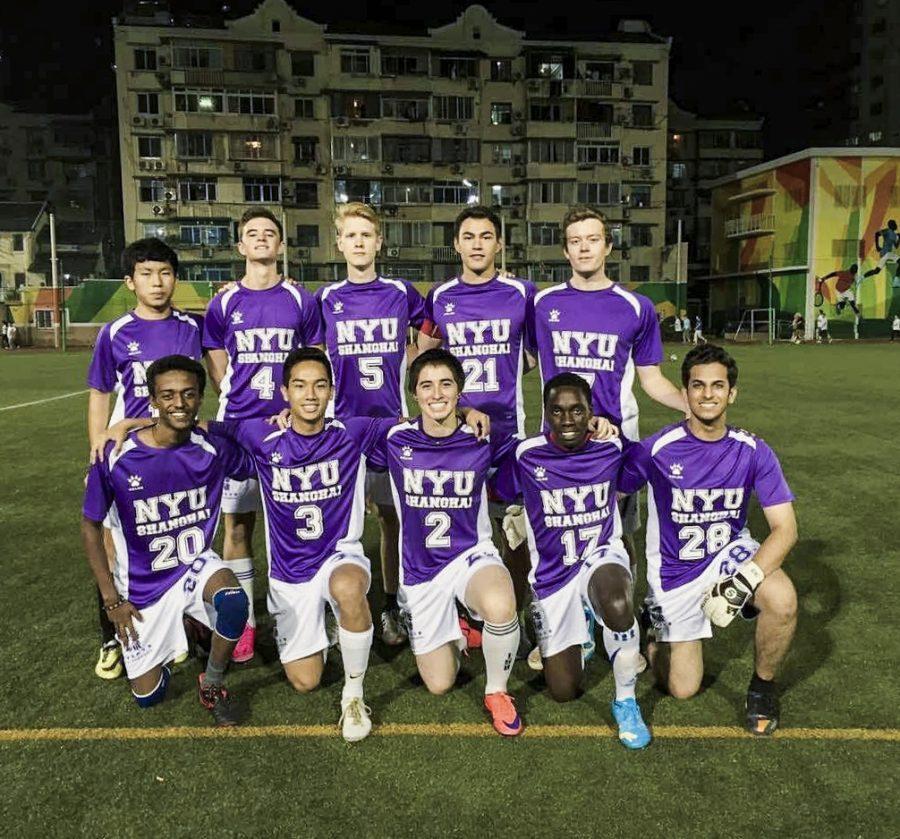Athletics Take Backseat in NYU Shanghai
Passionate about their sport, athletes studying at NYU Shanghai find the sports scene to be much more casual than it is in New York.
October 31, 2016
As the captain of NYU Shanghai’s soccer team, and a member of the basketball and flag football teams, Kilian Hauser, a junior studying interactive media arts, has a lot to say about NYU Shanghai athletics.
Much like here at the New York campus, NYU Shanghai also offers club and varsity sports. However, the level of commitment that comes with these sports is a little different from that of sports teams at the New York Campus.
For basketball and flag football, there are two practices a week for about two hours, while soccer only practices one a week for two hours. There’s also a shared coach for lifting and conditioning and a private coach that goes over specific strategies for the sport once a week.
“It’s about two to three days a week for about six to seven hours of commitment,” Hauser said. However, he went on to say that there are very few players who actually make that full commitment. “On average, the amount of time someone actually puts in is only two to three hours a week.”
There isn’t a whole lot of pressure on the athletes to show up to practice as many of them have class during the practice times. The practice facilities are also about a 30-minute commute without provided transportation.
“Mind you, you’re paying about three dollars for transportation on a round trip,” Hauser explained, as everything is much cheaper in Shanghai — except for health insurance, he added.
Hauser noted that the attendance among athletes is much better on the women’s teams. Annie Seaman, a junior studying Global China Studies and the captain of the women’s volleyball team at NYU Shanghai, can attest to this firsthand.
“All of our girls show up to practices,” Seaman said. “It was always worth it to be able to spend those hours together and play.”
Sevi Reyes, a junior studying computer science and interactive media arts at NYU Shanghai, is a dedicated co-founder of the NYU Shanghai tennis team, which began receiving school funding in the fall of 2015. He and his co-founder managed team practices without school administration for over a year before gaining their support. However, even now, getting into leagues is really up to the team members.
“When we started having formal training sessions with the coach, the students were even happier,” Hauser said of his team’s commitment and excitement for soccer.
As far as competition goes, rivalries and opponents vary from sport to sport. Seaman explained that NYU Shanghai volleyball isn’t technically in a league with other volleyball teams, so they end up playing Chinese high schools and other universities. “It’s hard to be competitive when there’s no real attainment,” said Seaman. “It was just like game practice almost.”
When asked about the most popular sport at NYU Shanghai, all three athletes agreed that basketball usually has the biggest attendance.
“We have big basketball games,” Hauser said. “Yale-NUS flew from Singapore to Shanghai to play against us.”
But with only around 900 full time students per semester, it’s simply hard to get a lot of involvement in athletics or maintain interest among the student body.
“In Shanghai, it’s always academics first,” Hauser said. “There are 20 or 30 different clubs and everything is broken up.” Reyes added that with such a small school, if a cohort doesn’t have a lot of athletes, then the team gets disbanded.
But the students who have stuck with it — or whose sports have stuck around — seem to find it a worthwhile endeavor.
“It’s a small community so if you put in your time and your work, it will pay off,” Seaman said. “I made really good friends.”
CORRECTION: A previous version of this article incorrectly stated that the basketball program had been cut. It has not. WSN regrets the error.
A version of this article appeared in the Monday, Oct. 31 print edition. Email Teresa Reiter at [email protected].















































































































































